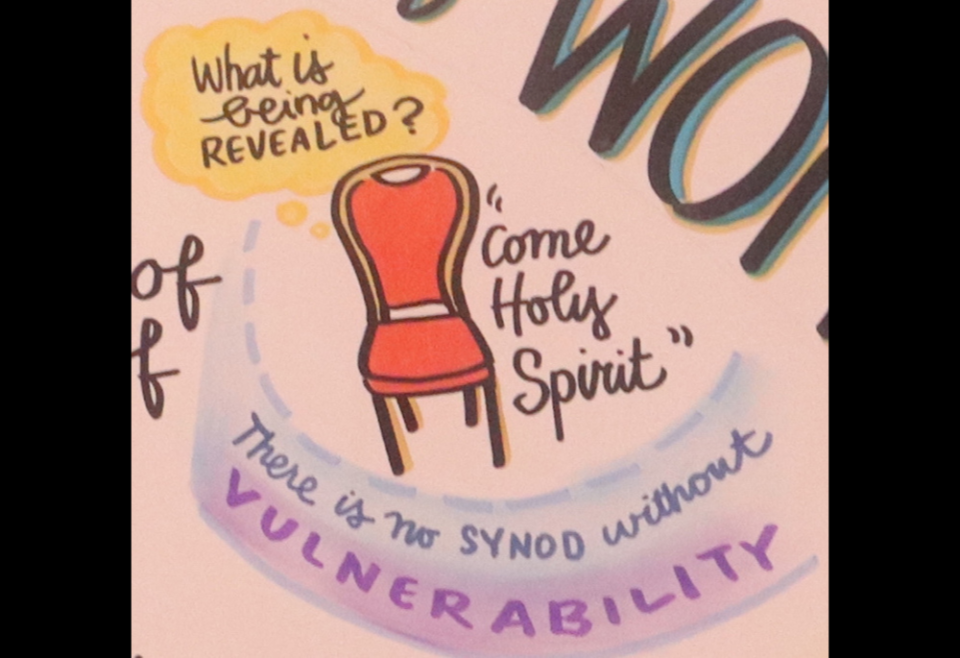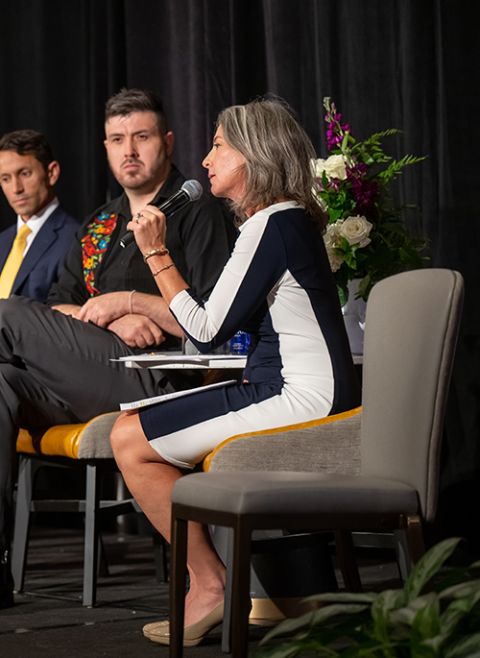Connections Partnership Summit 10.7.png

Washington — The Holy Spirit was the guest of honor at a recent gathering of church leaders on the topic of synodality. Literally. After one panelist suggested the practice of leaving an empty chair at meetings to symbolize room for the Holy Spirit, the next panel featured — you guessed it — an empty chair.
And organizers of the event were attributing to the Spirit the perfect timing that saw the U.S. national synthesis document — compiled after diocesan and other synodal gatherings throughout the U.S. — released just days before the Sept. 22-23 Catholic Partnership Summit in Washington, D.C. The event was organized by Leadership Roundtable, an organization that promotes co-responsibility between ordained and lay people as a best practice for church governance.
The kickoff keynoter, Maltese Cardinal Mario Grech, secretary-general of the Synod of Bishops, also mentioned the Spirit repeatedly in his provocative talk. Citing Pope Francis, he reminded participants that the Holy Spirit is the protagonist of the synod.
Leadership Roundtable Summit 2022 MF-0028 EDITED.jpg

Synodality is "a dialogue process that the Holy Spirit initiates and guides," Grech said, speaking via video from Frascati, Italy, where nearly three dozen people were synthesizing national reports for the next stage of the global synod. The process will culminate with an international meeting in Rome in October 2023.
We need to recognize the power of the Holy Spirit and that every member of the church is empowered by the Holy Spirit, Grech said.
Too many, including some church leaders, do not seem to trust the people of God, he said, calling such lack of trust "another form of abuse."
"The Holy Spirit must be given more breathing space," he said. "We cannot lock him in a cage."
Of course, this all sounds well and good, until you realize that those who disagree vehemently with you most likely believe they, too, are inspired by the Holy Spirit. Discerning the presence of the Spirit requires patience, listening and prayer. It can be too easy to push an agenda and "put the sticker of the Holy Spirit on it," as one later panelist said.
Toward the end of the question-and-answer with Grech, the cardinal noted that the presence of the Holy Spirit is evidenced by harmony: "Where there is division, the Holy Spirit is not present."
But a member of another summit panel, an author and expert on conflict negotiation, respectfully disagreed with the cardinal, arguing that "conflict is where the Spirit is working."
The expert encouraged embracing conflict with a spirit of "conflict resilience," a skill that allows people to be in dialogue with those with whom they disagree and to not necessarily resolve those differences.
Grounded in genuine curiosity, such dialogue must feature a safe space for people to speak about their experiences, the expert said. Rather than promote a peaceful uniformity, dialogue actually requires people to assert themselves so they can be heard.
(The summit gathering operated under Chatham House Rule, in which information may be shared, but not the identity or affiliation of the speaker. Grech later agreed for his talk to be on the record.)
A frustration over not being heard was palpable during a panel on "The Vital Role of Women's Leadership in the Church." Although women can and do lead in many ways in the church, panelists also shared stories of real heartache about how women are treated. In the Q&A, one bishop raised concerns about the "dangerous intersection of clericalism and misogyny," especially among seminarians.
The U.S. synthesis document clearly summarizes a groundswell of concern about marginalized groups, including women and LGBTQ+ Catholics, although, as one leader in Hispanic ministry pointed out to me, the document fails to mention Latinos or Hispanics specifically, except as part of a list of "diverse ethnic and cultural communities, including immigrant communities from Latin America, Asia, Africa, and other recent arrivals."
That is a disappointment, since, as one summit panelist noted of the series of Encuentro gatherings of U.S. Hispanics, those meetings were "the best school on synodality and women's leadership in the Catholic Church in the United States."
Advertisement
Advertisement
So what will the Holy Spirit's movement in the synodal process look like? Traditionally, images such as wind and fire have been used to capture the movement of the Spirit, so we should not expect things to be tame and mild.
Too often the Holy Spirit is seen as a lesser or even forgotten part of the trinity — the "two men and a bird" problem identified by feminist theologian Sandra Schneiders. But as fellow feminist theologian Elizabeth Johnson reminds in her groundbreaking book She Who Is, the name "Spirit" was traditionally given to the "movement of the living God that can be traced in and through experience of the world." (She also notes that the Spirit has throughout history been spoken of with feminine imagery.)
The Spirit's presence is often more noticeable in darkness than in light, she writes, noting the prevalence of "God drawing near and passing by in vivifying, sustaining, renewing, and liberating power in the midst of historical struggle."
"So profoundly is this true that whenever people speak in a generic way of God, of their experience of God or of God's doing something in the world, more often than not they are referring to the Spirit, if a triune prism be introduced," Johnson writes.
It does not seem a coincidence that Pope Francis has entrusted this process of synodality to the Holy Spirit, while encouraging an open conversation in which people share their experiences of God in their lives, in their church and in the world. The Spirit is clearly already at work in this process. May She continue to be trusted, so that the church can be renewed to do its work in the world.



